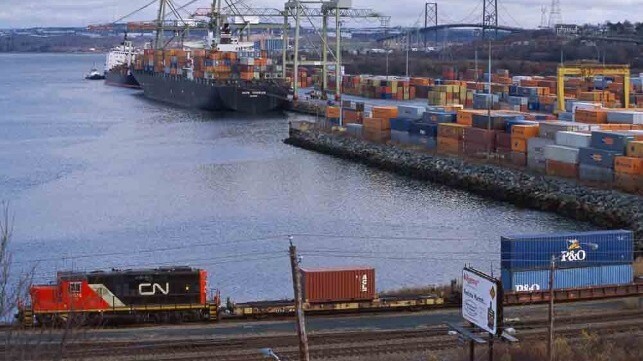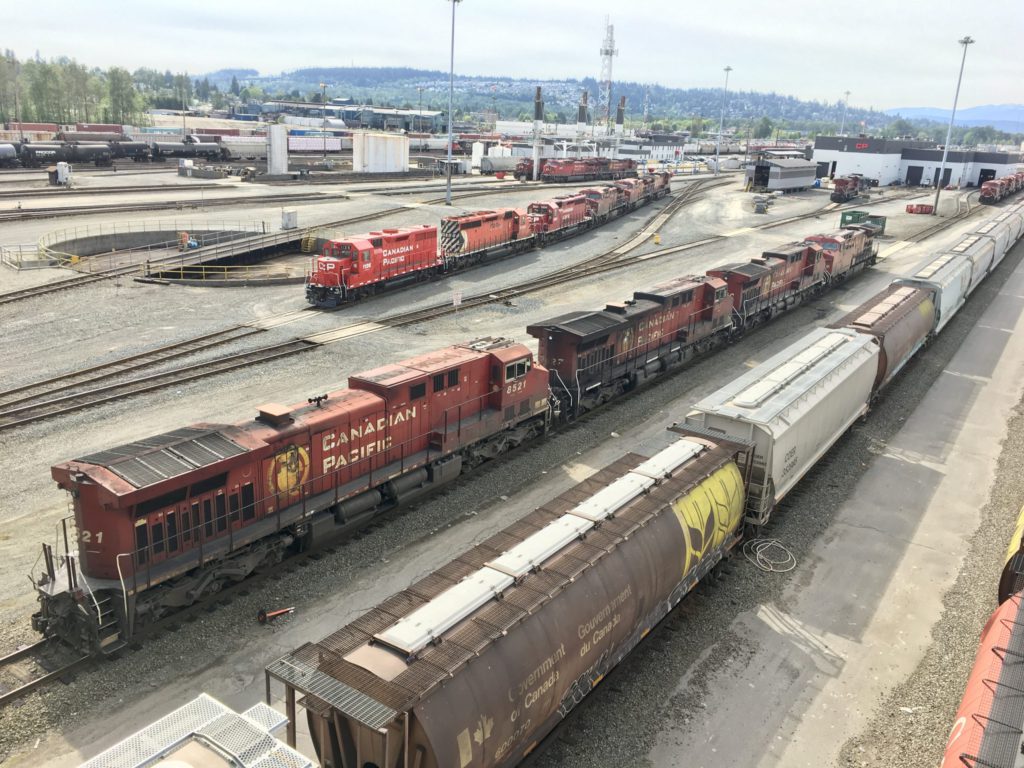Teamsters Renew Canadian Railroad Strike After Government Sets Arbitration

Hours after saying they would take down their picket lines, the Teamsters Canada Rail Conference served a new strike notice on CN, one of the two main Canadian railroads. The notice was in defiance of the federal government which on Thursday reversed its earlier stance that the labor disputes between the Teamsters union and Canada’s two national railroads should be resolved at the bargaining table.
Thursday afternoon the federal government intervened hours after the strike began saying it would impose final binding arbitration. As of Friday morning, CN was resuming operations while CPKC was waiting for government actions.
The union first said it planned to challenge the government's order for mandatory arbitration in court. The Teamsters Canada had told Reuters it was going to challenge the constitutionality of directing the dispute to Canada's labor board which would impose terms for the new contract. Late today CN confirmed it has received a new 72-hour strike notice for the union to resume the strike.
The two national railroad systems moved to lockout nearly 10,000 Teamster members as of 12:01 a.m. on Thursday after a previously ordered government cooling-off period came to an end. It was a rare event as normally Canada’s two railroads negotiate contracts in alternating years but this year each was in disputes over a range of issues. CPKC said it had been negotiating for about a year while CN said talks had started about nine months ago.
Talks had continued during the day on Thursday and were due to continue Friday. However, Labor Minister Steven MacKinnon said in a statement “The economic risk was too great to allow the lockouts to continue.” He said it was the government’s assessment that the parties were “are a fundamental impasse.” The Teamsters however are now disputing that they are at an impasse and said the negotiations should continue.
Canada, the minister said on Thursday is a trading nation and the dangers were too great for the strikes to continue. Government figures show that more than US$700 million a day in goods move in the Canadian rail system. Last year the railroads handled more than 375 million tons of freight. Major exports including grain and timber were set to be impacted as well as imports and cross-border industries such as autos. In the U.S., the White House had convened a Supply Chain Disruption Task Force.
Many shippers were scrambling to reroute their cargo, but there were fears that Canadian ports would become quickly backlogged. Key industries were reported to have at most a week before the strike would impact operations.
The federal government last week had refused to step in repeating its frequent stance that labor issues are best resolved through negotiations. Industrial leaders were pushing for the government to become more directly involved.
MacKinnon said while the dispute was between the union and railroads, the effects and impacts would be felt by all Canadians. He invoked the Canada Labour Code saying it was in the interest of “secure industrial peace and delivery.” He directed the Canadian Industrial Relations Board to become directly involved again reviewing the case and imposing final binding arbitration.
CN withdrew its lockout on Thursday evening and said operations would begin to resume on Friday. Teamsters were reporting for work, but the restart is sporadic and expected to take into the weekend to complete. CPKC was waiting for an official order from the Board before ending the lockout. The Minister said he wanted operations to resume “forthwith,” while admitting it might take a few days.
In addition to freight operations, more than 30,000 daily commuters were being impacted by the strike. The local lines share track with the two major railroads and were being forced to suspend operations.
Train turmoil unresolved in Canada as new labour action looms
Henry Lazenby - The Northern Miner | August 23, 2024 |

Canadian Pacific Kansas City Railway locomotives stand idle in a Vancouver yard. Credit: Henry Lazenby
Canada’s rail disruption that Ottawa ordered to binding arbitration has new wheels a day later.

The Teamsters Canada Rail Conference union on Friday issued a fresh 72-hour notice to Canadian National Railway (TSX: CN; NYSE: CN) that its 6,500 members will down tools at CN from 10 a.m. EST Monday. Union bosses say there has been no progress around the negotiation table.
“We do not believe that any of the matters we have been discussing over the last several days are insurmountable,” the Teamsters told CN in a notice. ”We remain available for discussion in order to resolve this matter without a further work stoppage.”.
On Thursday, the federal Labour Minister Steven MacKinnon referred negotiations to binding arbitration, which ended a CN lockout that began midnight Wednesday. But a strike at Canadian Pacific Kansas City Railway (TSX: CP; NYSE: CP) continues. The union criticizes the government’s decision, accusing it of undermining collective bargaining. Minister Steve MacKinnon has vowed back-to-work legislation.
It’s a rare occurrence for both of Canada’s major rail networks to stop operating at the same time. Industries depend on them for transport across the country and thousands of kilometres of tracks in the United States and Mexico, in CPKC’s case. However, the strike only affects Canadian operations.
Mining products account for more than half of Canada’s rail-freight volume, with over 160 million tonnes of crude and processed minerals transported in 2022. The sector typically generates over C$6 billion annually in rail freight expenditures.
The Mining Association of Canada (MAC) and the Saskatchewan Mining Association (SMA) expressed deep concern over the first-ever simultaneous rail disruption.
“As the single largest industrial customer group of Canada’s railways, the mining sector has seen first-hand how detrimental unpredictable work stoppages are to Canada’s reputation as a reliable trading partner,” Pierre Gratton, MAC’s president and CEO, said in a statement Thursday before the labour minister acted.
Fertilizer impact
Nutrien (TSX: NTR; NYSE: NTR), one of the world’s largest potash producers, expressed its frustration with the labour dispute in a statement before the arbitration order.
“We are disappointed that the parties involved in this dispute have failed to prevent what has become another significant disruption to vital supply chains serving the agricultural industry,” Nutrien’s chief commercial officer, Mark Thompson, said by email to The Northern Miner. The company relies on Canadian rail to deliver essential crop inputs globally, directly impacting global food security.
German-owned K+S Potash Canada, which operates the Bethune mine in Saskatchewan, said it was prepared to maintain operations. “If required, slight adjustments can be made; however, a prolonged work stoppage will have potentially significant impacts to our operation and production,” spokesperson Sydney Gossard said in an email to The Northern Miner.
Landlocked Saskatchewan’s mining industry relies heavily on rail service to export products like potash. The province’s potash, valued at C$10.9 billion in 2023, represents about a third of the world’s supply, according to the SMA.
“Rail is the only way to transport bulk tonnage product to export markets,” Pam Schwann, SMA president, said in a statement. “Even a few days of stopped or delayed services takes the system weeks to recover, with a cost in the billions of dollars.”
Schwann warned that prolonged disruptions could further erode Canada’s market share to global competitors like Belarus and Russia, particularly in potash, where Canada has already experienced setbacks due to previous strikes.
Other routes
Vancouver-based Teck Resources (TSX: TECK.B) said it sought alternative transportation methods to ease the disruption.
“The interruption of rail service is negative for our partners and customers in the critical minerals supply chain,” Teck spokesperson Maclean Kay said in a statement to The Northern Miner. “We encourage all parties and government to resolve this dispute before there are further negative impacts.”
Canada’s largest uranium miner, Cameco (TSX: CCO; NYSE: CCJ), said by email it was concerned about the railed supply of anhydrous hydrogen fluoride to its Port Hope Conversion Facility in Ontario.
Miles apart
Both rail companies had cited union demands as obstacles. CN proposed improved wages and predictable schedules, while CPKC underlined its commitment to fair arbitration.
Teamsters president Paul Boucher alleged that CN and CPKC were willing to compromise rail safety and “tear families apart to earn an extra buck.”
“The railroads don’t care about farmers, small businesses, supply chains, or their own employees,” he said in a release. “Their sole focus is boosting their bottom line, even if it means jeopardizing the entire economy.”
Canada frequently sees rail disruptions. The 2023 West Coast Ports strike, the pandemic and civil disruption in the form of random and sporadic rail blockades have damaged Canada’s reputation as a reliable trading partner, the MAC contends.
“Canada can and must do better at creating a stable and predictable logistics supply chain that restores greater confidence in Canada’s reliability as a trading partner,” Gratton said. “Government should make every effort and use every tool at their disposal to address this unprecedented disruption.
“Failure to do so is an abdication of leadership and an abandonment of responsibility.”
No comments:
Post a Comment